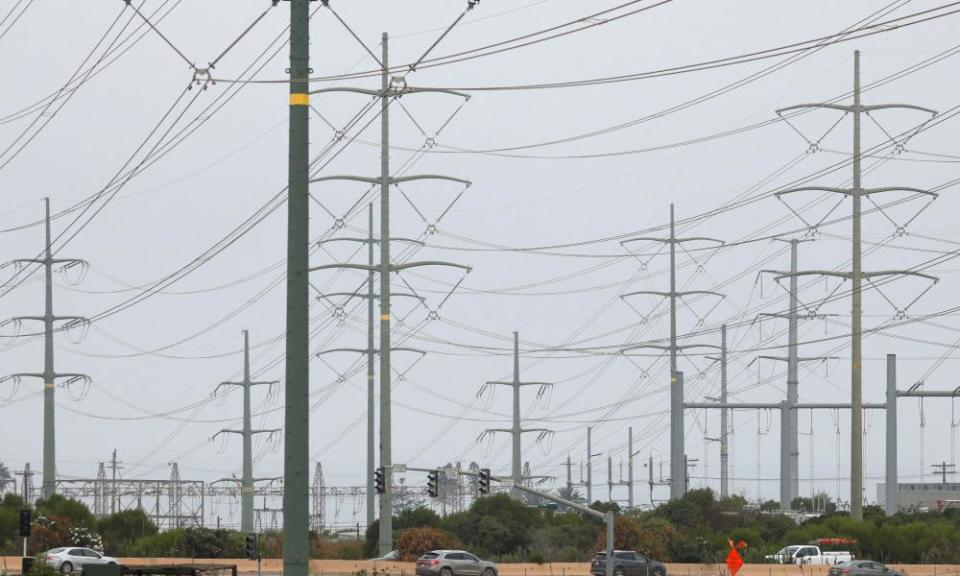Governor demands investigation after Californians left without power in extreme heat
California’s governor has demanded an investigation into why residents were left without electricity during an extreme heatwave and a pandemic, with no prior warning or time to prepare, after the state saw rolling blackouts over the weekend for the first time in nearly two decades.
On Monday, Gavin Newsom lambasted the unanticipated disruptions on Friday and Saturday as “unacceptable”.
“We failed to predict and plan for these shortages, and that’s unacceptable,” Newsom said at a press conference. “I have taken responsibility as your governor to immediately address this issue to move forward and ensure it simply never happens again.” He signed an emergency proclamation allowing some energy users and utilities to use backup sources during peak times.
Still, millions of Californians could be subject to more rolling blackouts this week, according to the state’s largest electrical grid manager, the California Independent System Operator (ISO).
On Monday, the California ISO said it will probably order utility companies to turn off power starting around 4pm local time, as demand for electricity to cool homes soars during the hottest part of the day.
Steve Berberich, California ISO’s CEO and president, said that the state is short about 4,400 megawatts, meaning that up to 3.3m homes may lose power, and those affected can expect to lose power for about two hours. He did not say where the outages might occur, which are up to the state’s utilities.
The electricity outages have arrived as the coronavirus pandemic continues to devastate the state, and amid a bout of dramatic weather that brought on lightning storms, fire tornadoes, and a near-record temperature of 54.4C (129.9F) to California’s Death Valley.
The recent outages were not triggered – as past power shutoffs have been – as a safety measure to prevent wildfires from sparking. Rather, they were caused by energy supply issues. Californians seeking to cool their homes as temperatures soared into triple digits caused a surge in the demand for electricity through the weekend. Demand is likely to exceed supply early this week as the broiling, record breaking heatwave persists.
The lack of electricity could be especially devastating now, while Americans have been encouraged to stay home in order to slow the spread of coronavirus – and air-conditioned malls, libraries and other indoor public gathering spaces remain closed. Heatwaves have deadly consequences, especially for poor, minority, older and unhoused populations – and extreme heat kills more Americans than all other natural disasters combined. While hundreds of thousands were unable to run their air conditioners during outages, many more lack access to AC, or are unable to pay electrical bills – and are especially vulnerable this week.
Related: 'A summer unlike any other': heatwaves and Covid-19 are a deadly combination
“I was utterly astonished when it happened on Friday,” said David Marcus, an energy consultant based in Bay Area and a former adviser to the California Energy Commission.
The ISO, a non-profit entity that regulates electricity for most of California, said it ordered rolling outages that cut off power to more than 410,000 homes and businesses for three and a half hours on Friday evening after the “unexpected loss” of a 470-megawatt power plant and 1,000 megawatts of wind power. The ISO issued a second, shorter outage on Saturday evening that cut power to more than 200,000 customers.

The authority also issued an advisory through Wednesday, calling for Californians to voluntarily conserve electricity by setting their thermostats at 78F or higher and turning off unnecessary appliances. Both outages were issued in the evening when energy generated from solar power began to decline as the sun set.
But the ISO’s reasoning doesn’t quite add up, Marcus told the Guardian. Solar production by definition goes down in the evening – “that should have come as no surprise to anyone”. Energy use also trends down as the sun sets and the temperature cools. “So I have no idea why the blackouts happened.”
The ISO has traditionally ordered a stage 3 alert that triggers the state’s largest utility companies to cut power to some customers when the state energy reserves are at or lower than 3%. On Saturday, the operating reserves stood at 8.9% when the ISO issued a stage 3 alert, Marcus said. “I’m extremely curious to see what explanation they’ll have as to why they turned people’s lights off when they had 8.9% in reserves – when they told citizens they wouldn’t do that until they reached 3% reserves.”
An annual outlook published by the ISO predicted a 1% chance that rolling outages would occur in 2020.
“To me, they had adequate access to power, but they did not manage those assets properly,” said Bill Powers, an energy consultant based in San Diego. “Fundamentally, they dropped the ball.”
Powers blames the energy authority’s focus on cost efficiency – which may have disincentivized the ISO to operate older, more expensive to run power plants as backup sources ahead of heatwaves. It is notable that public utilities that do not belong to the ISO – including the Sacramento Municipal Utility District – did not have blackouts on Friday. “To me, that says public utilities are just more cognizant of the need to serve their customers and not just used them as a profit base,” Power said.
This weekend’s rolling blackouts were the first since the 2001 energy crisis, when energy traders from Enron Corp and other companies took advantage of loopholes in the states newly-deregulated electricity system and withheld power to drive up prices.
In an alert issued on Sunday, the ISO said the heatwave “is causing a strain on supplies, and consumers should be prepared for likely rolling outages during the late afternoons and early evenings through Wednesday”. The power grid manager did not immediately respond to queries from the Guardian.
Mario Koran and agencies contributed reporting

